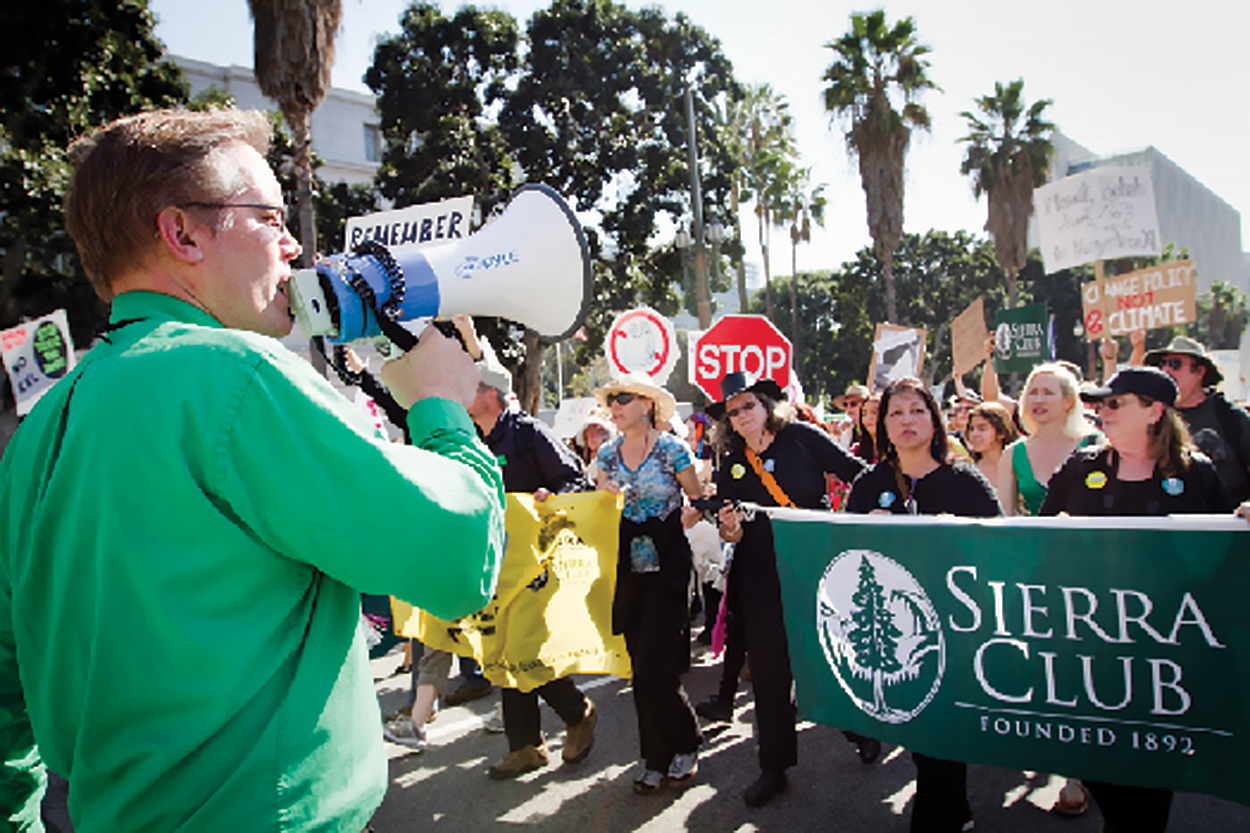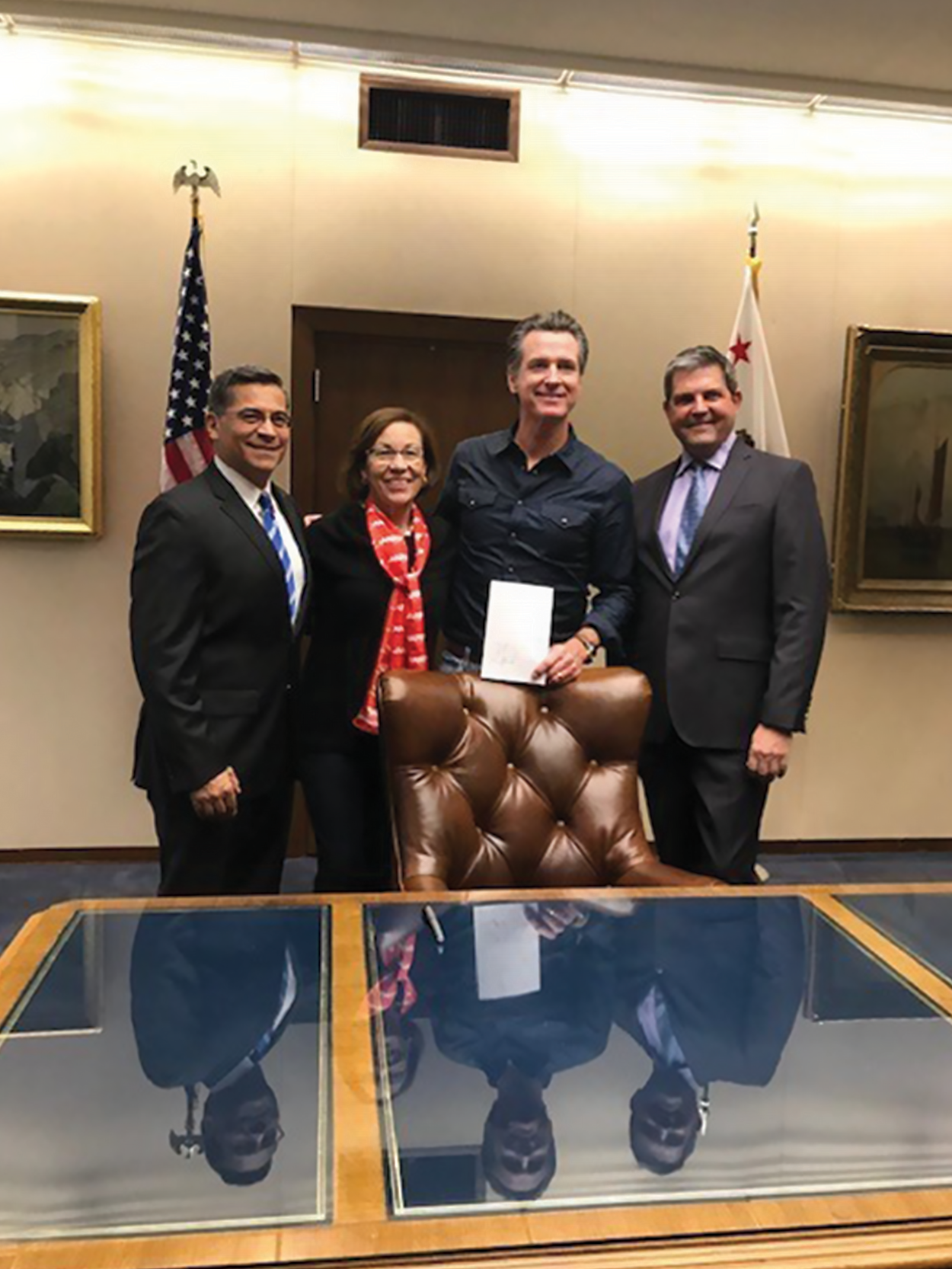Table of Contents |
While the term interest group is not mentioned in the U.S. Constitution, over 200,000 interest groups play an active role in the U.S. democratic system. Interest groups are formal associations of individuals or organizations that act to advance a shared interest, and which often attempt to influence government decision-making and shape public policy.
Interest groups differ from political parties. Unlike political parties, interest groups do not function primarily to elect candidates under a certain party label, or to directly control the operation of the government. Political parties in the United States are generally much broader coalitions that represent a significant proportion of citizens. In the American two-party system, the Democratic and Republican Parties spread relatively wide nets to try to encompass large segments of the population. In contrast, while interest groups may support or oppose political candidates, their goals are usually more specific. They narrowly focus on issues, such as taxes, the environment, gun rights, or gun control.
EXAMPLE
National interest groups include the Sierra Club and the National Rifle Association. The Sierra Club is an organization that advocates for environmental issues such as clean energy and fighting climate change. The National Rifle is a national organization dedicated to protecting the Second Amendment rights of Americans.As a result of their narrow focus, interest groups generally have much more limited membership than political parties. Interest group activity often also transcends party lines. However, some groups are perceived as being more supportive of one party than the other.
EXAMPLE
The American Conservative Union, Citizens United, the National Rifle Association, and National Right to Life are more likely to have relationships with Republican lawmakers than with Democratic ones. Americans for Democratic Action, Campaign for America's Future, and People for the American Way all have stronger relationships with the Democratic Party.Political parties and interest groups tend to both work together and compete for influence. At the state level, there is typically an inverse relationship between them in terms of power. Interest groups often have greater influence in states where the political parties are comparatively weaker.
Interest groups fulfill many vital functions in the U.S. political system. They advocate for the interests of sectors of the population both within government and society more generally. Interest groups also:
Interest groups offer individuals an important avenue for political participation and they facilitate participation in a number of ways. Joining interest groups can help facilitate civic engagement, which allows people to feel more connected to the political and social community. Some interest groups develop as grassroots movements, which begin from the bottom up among people at the local level. Interest groups can amplify the voices of such individuals through proper organization, and allow them to participate in ways that would be less effective or even impossible at a smaller scale (Figure 1).

Grassroots interest groups have increasingly utilized digital technology to draw attention to their causes. Perhaps most visible in recent years is the use of so-called hashtag activism. The hashtag originated on the social media platform Twitter, and some hashtags have induced enormous press coverage.
IN CONTEXT
The most impactful use might have been the #MeToo movement. Picking up on a technique activist Tarana Burke initiated in 2006, actress Alyssa Milano identified herself as a survivor of sexual abuse and suggested that “If all the women who have been sexually harassed or assaulted wrote ‘Me, too’ as a status, we might give people a sense of the magnitude of the problem.” Her post went viral, and the movement snowballed quickly as woman after woman confirmed that they had faced harassment.
Interest groups provide a means of representing people and serve as a link between people and the government at all three levels–local, state, and federal (Figure 2). They allow people to actively work on an issue in an effort to influence public policy. Interest groups also try to get issues on the government agenda and to monitor a variety of government programs. They lobby all three branches of government–the president and the bureaucracy, Congress, and the judiciary.

IN CONTEXT
Following the passage of the Affordable Care Act (ACA), numerous interest groups have been monitoring the implementation of the law, hoping to use successes and failures to justify their positions for and against the legislation. Those opposed have utilized the court system to try to alter or eliminate the law, or have lobbied executive agencies or departments that have a role in the law’s implementation.
Another function of interest groups is to educate. Interest groups research issues, and in turn attempt to inform the public and other stakeholders–such as related groups and policymakers–about an issue. While some people think of interest groups as well-financed individuals and organizations attempting to persuade policymakers, their most potent resource is research. Interest groups are often armed with briefs, fact sheets, and other documents that inform policymakers and others about an issue. Through their research, interest groups often develop policy proposals or other solutions that address their issue or cause. They can then use their resources to press the government to adopt their proposals. Large interest groups often employ researchers, policy analysts, and communication professionals to facilitate both the development and the dissemination of their research.
IN CONTEXT
The National Conference of State Legislatures (NCSL) is an interest group that serves the needs of people active in state legislatures, in part by conducting research into government. For example, the NCSL provides a list of the states that have laws requiring that voters provide identification at the polls.
Another interest group, the National Association for the Advancement of Colored People (NAACP) advocates for civil rights and keeps track of proposed voter-identification bills in state legislatures that might have an effect on voting rights. The NAACP will encourage group members to take action by either donating money or by directly contacting lawmakers about the proposed bill.
Interest groups also help frame issues, usually in a way that benefits their cause. Often, but not always, they may compete with other interest groups to normalize their take on an issue.
EXAMPLE
Abortion rights advocates often use the term “pro-choice” to frame abortion as an individual’s private choice to be made free of government interference, while an anti-abortion group might use the term “pro-life” to frame its position as protecting the life of the unborn. “Pro-life” groups often label their opponents as “pro-abortion,” rather than “pro-choice,” a distinction that can affect the way the public perceives the issue.Despite the fact that interest groups are not mentioned in the Constitution, the founders were aware that they would arise, and also that they would play an active role in the democratic system. In fact, in Federalist No. 10, James Madison warned of the dangers of factions. Madison defines a faction in negative terms.
"By faction, I understand a number of citizens, whether amounting to a minority or majority of the whole, who are united and actuated by some common impulse of passion, or of interest, adverse to the rights of other citizens, or to the permanent and aggregate interests of the community."
In other words, Madison recognized that in acting to advance the interest of a particular group, they may act against the interests of another group or the population as a whole. In societies, interests inevitably clash.
IN CONTEXT
The American Association of Retired Persons (AARP) is a large interest group that advocates for the interests of Americans 50 years old or above. Because they have so many members, they can contact companies to provide group discounts for their members–for example, at restaurants or large stores.
However, the AARP also pressures the government to fund policies that are of special interest to older people, such as programs that combat the financial exploitation of older people or that reduce the cost of medication for illnesses that target the elderly.
Other groups, however, may have other goals that they need to advance using government funding, such as job training or higher education for young people. Since government funds are limited, one program can come at the expense of others. Hence, the needs of the older population may conflict, at times, with the needs of the younger population.
Madison believed that the best solution was to let factions flourish and compete against each other. In this way, no one group would ever become so strong that it could dominate others over a long period of time and deny the needs and rights of other sectors of the population.
The sheer number of interest groups in the United States suggests that they certainly have flourished. They compete with similar groups for membership, and with opponents for access to decision-makers.
Pluralist scholars, such as David Truman, suggest that people naturally join groups and that there will be a great deal of competition for access to decision-makers. Scholars who subscribe to this pluralist view assume that this competition among diverse interests is good for democracy. Political theorist Robert Dahl argues that “all active and legitimate groups ha[ve] the potential to make themselves heard.”
However, not all scholars accept the premise that mobilization is natural, or that all groups have the potential for access to decision-makers. The elite critique suggests that certain interests, typically businesses and the wealthy, are advantaged and that policies most often reflect their wishes. Political scientist E. E. Schattschneider noted that “the flaw in the pluralist heaven is that the heavenly chorus sings with a strong upper-class accent.”
Scholars that advance this elite critique suggest that businesses and other wealthy interests are overrepresented before government and that poorer interests are at a comparative disadvantage. They point out that wealthy groups have more resources to hire lobbyists to represent them and to make financial contributions to politicians, which at least grants them access. Disadvantaged interests face many challenges, including shortages of resources, time, and skills.
While most scholars agree that some interests do have advantages, others have questioned the overwhelming dominance of certain interests. Additionally, neopluralist scholars argue that some interests are in a privileged position, but these interests still do not always get what they want. Their influence depends on a number of factors in the political environment, including public opinion, political culture, competition for access, and the relevance of the issue.
EXAMPLE
If a prominent manufacturing firm wants fewer regulations on environmental pollutants, and environmental protection is an important issue to the public, the manufacturing firm may not win in every exchange, despite its resource advantage.Even wealthy interests do not always win if their position is at odds with the wish of an attentive public. And if the public cares about the issue, politicians may be reluctant to defy their constituents. We also know that when interests mobilize, opposing interests often counter-mobilize, which can reduce the advantages of some interests. Thus, the conclusion that businesses, the wealthy, and elites win in every situation is overstated.
IN CONTEXT
A good example is a dispute between fast food chains and their employees. During the spring of 2015, workers at McDonald’s restaurants across the country went on strike and marched in protest of the low wages the fast food giant paid its employees. Despite the opposition of restaurant chains and claims by the National Restaurant Association that increasing the minimum wage would result in the loss of jobs, in September 2015, the state of New York raised the minimum wage for fast food employees to $15 per hour, to be phased in over time. Buoyed by this success, fast food workers in other cities campaigned for a pay increase. While the goal of a nationwide $15 minimum wage has not yet been realized, in April 2021, President Biden issued an executive order to raise the minimum wage of federal contractors to $15 per hour.
Source: THIS TUTORIAL HAS BEEN ADAPTED FROM OPENSTAX “AMERICAN GOVERNMENT 3E”. ACCESS FOR FREE AT OPENSTAX.ORG/DETAILS/BOOKS/AMERICAN-GOVERNMENT-3E. LICENSE: CREATIVE COMMONS ATTRIBUTION 4.0 INTERNATIONAL.
REFERENCES
Reilly, K. (2022, October 15). Alyssa Milano marks the 5-year anniversary of her #MeToo tweet. Yahoo! Entertainment. www.yahoo.com/entertainment/alyssa-milano-metoo-5-year-anniversary-173818758.html